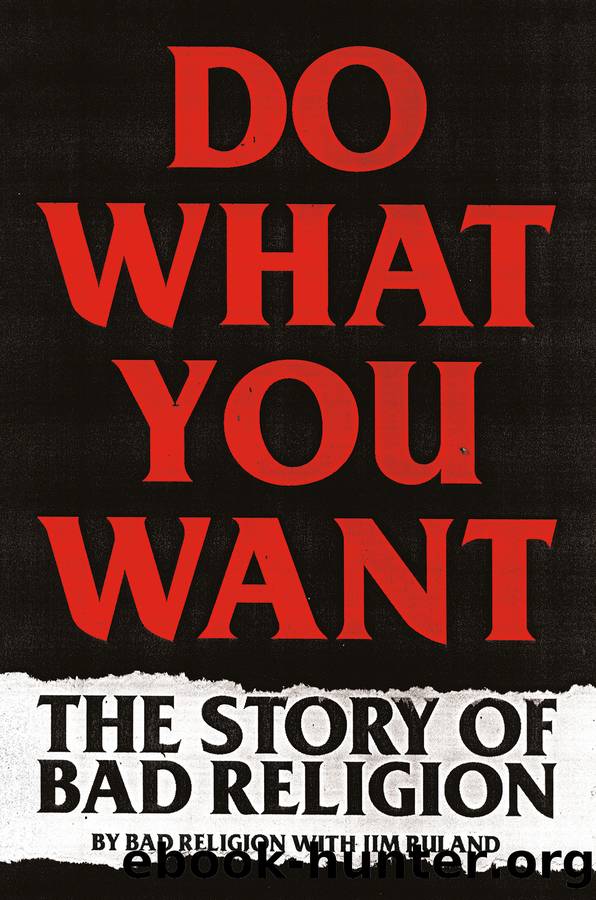Do What You Want by Jim Ruland

Author:Jim Ruland [Bad Religion with Jim Ruland]
Language: eng
Format: epub
Publisher: Hachette Books
Published: 2020-08-18T00:00:00+00:00
Footnotes
1. On December 10, 1981, Smoke 7 Records released a compilation of L.A. hardcore bands called Public Service that included Bad Religion, Circle One, Disability, Red Cross (soon to be Redd Kross), and RF7. The Bad Religion songs “Drastic Actions,” “Slaves,” and “Bad Religion” were recorded specifically for the comp.
15
A SUBTLE FUCK YOU
IF 1991 WAS THE YEAR THAT REINTRODUCED AMERICA to underground music, 1994 was when the underground broke through to the mainstream—and Bad Religion and Epitaph Records were there to give it a hard shove.
First, Green Day released Dookie, their third studio album and first on a major label, in February. This was followed by two Epitaph releases: the Offspring’s Smash in early April and Rancid’s Let’s Go in June. Then came Bad Religion’s major label debut and eighth studio album, Stranger Than Fiction, in September. It was the year that punk exploded, and Brett Gurewitz had his hand on the detonator for three of the four records.
By 1994, Bad Religion was known for their melodic hardcore sound and intelligent lyrics, but it was the latter that received the lion’s share of attention in the press. The fact that the band’s front man was pursuing his Ph.D. in evolutionary biology had something to do with this. Bad Religion’s “punk professor” was a common theme in articles and interviews. Less well known was Brett’s business savvy and entrepreneurial genius. Though it was an open secret within the band, the world was about to find out just how formidable Epitaph’s founder was.
The year began with Brett’s decision to expand Epitaph’s operations overseas. In addition to adding more musicians to Epitaph’s roster and releasing new records, Brett was looking to establish an office in Europe. He turned to one of his oldest friends and a founding member of Bad Religion: former drummer Jay Ziskrout.
After Ziskrout had left Bad Religion, he stayed in the music industry and eventually ended up working in marketing and promotion for Arista Records in New York. Brett and Ziskrout reconnected a few years after he quit the band and met face-to-face in France at an international music conference and trade show. Brett expressed his desire to open an office in Europe and Ziskrout said, “That’s something I can do.”
Brett enlisted his help and Ziskrout left New York to come work in the Epitaph office in L.A. They drafted a proper business plan, set down the ethos of the company, and hammered out a mission statement. Together they created a guide to what everyone in the company needed to know from an artistic and business perspective. “He actually had more record business experience than I did,” Brett said of Ziskrout. “All I knew was the DIY way of doing things. I looked up to him and I needed somebody to open an office over there in Europe.”
While they were working on Epitaph Europe, the Offspring were working on their new album at Track Record’s new location in North Hollywood. Brett had hired his favorite punk rock producer, Thom Wilson, who had produced the Offspring’s two previous records and an EP.
Download
This site does not store any files on its server. We only index and link to content provided by other sites. Please contact the content providers to delete copyright contents if any and email us, we'll remove relevant links or contents immediately.
Harry Potter and the Goblet Of Fire by J.K. Rowling(3023)
Unfinished: A Memoir by Priyanka Chopra Jonas(2911)
Never by Ken Follett(2869)
The Man Who Died Twice by Richard Osman(2289)
Machine Learning at Scale with H2O by Gregory Keys | David Whiting(2263)
Fairy Tale by Stephen King(2058)
Will by Will Smith(2032)
Rationality by Steven Pinker(1759)
The Storyteller by Dave Grohl(1655)
The Dawn of Everything: A New History of Humanity by David Graeber & David Wengrow(1564)
The Dark Hours by Michael Connelly(1562)
The Stranger in the Lifeboat by Mitch Albom(1526)
Cloud Cuckoo Land by Anthony Doerr(1428)
The Becoming by Nora Roberts(1323)
Friends, Lovers, and the Big Terrible Thing by Matthew Perry(1320)
Crying in H Mart by Michelle Zauner(1312)
Einstein: His Life and Universe by Walter Isaacson(1311)
New Morning Mercies: A Daily Gospel Devotional by Paul David Tripp(1299)
A Short History of War by Jeremy Black(1295)
